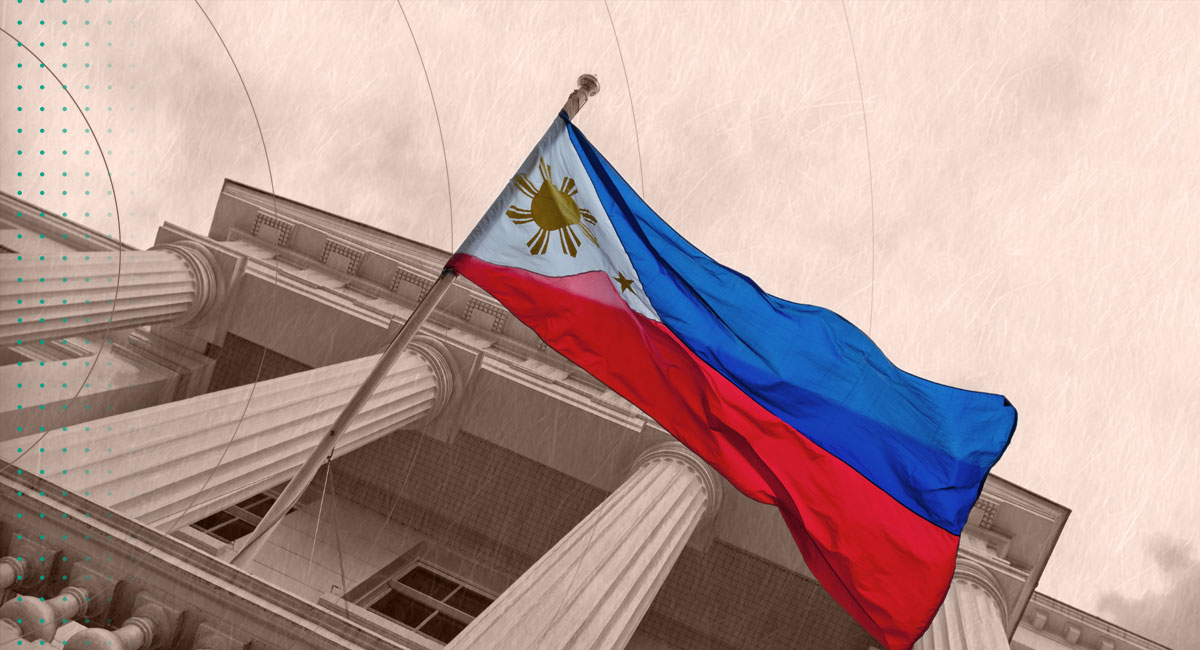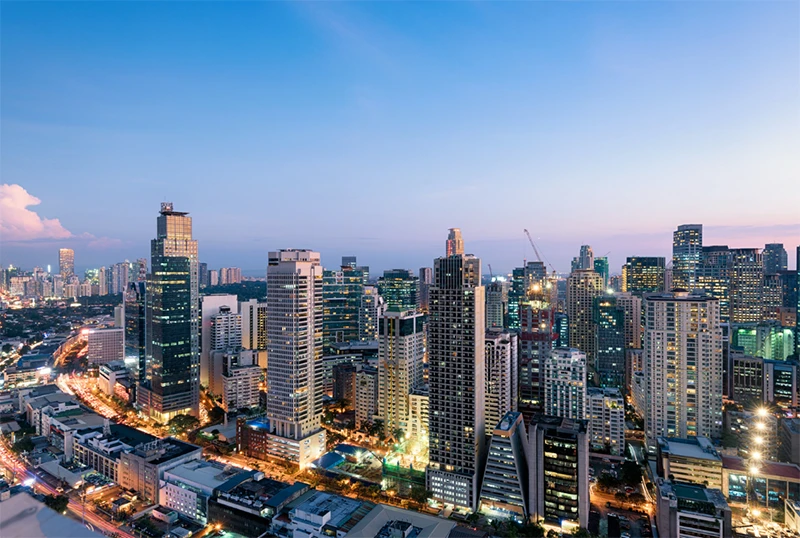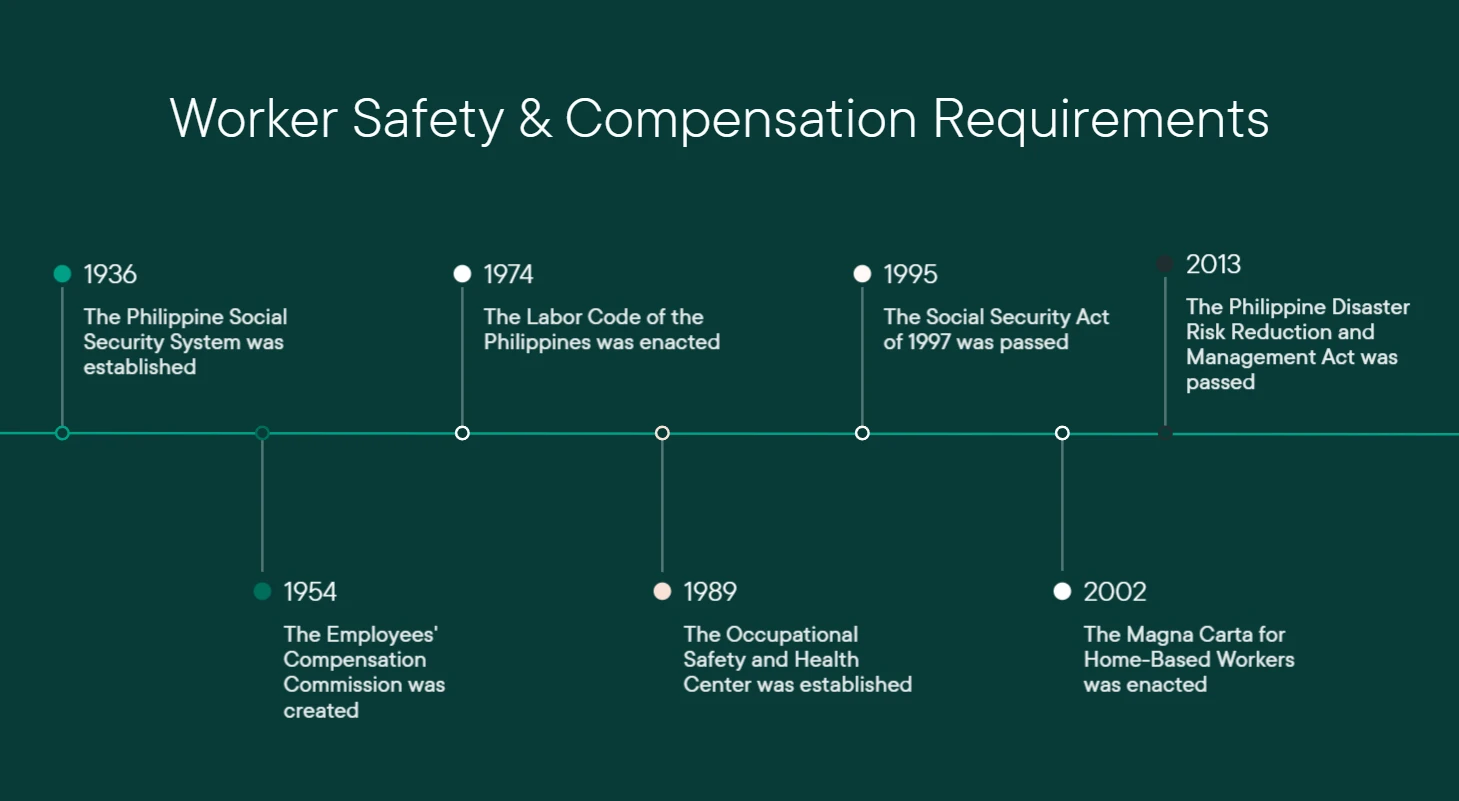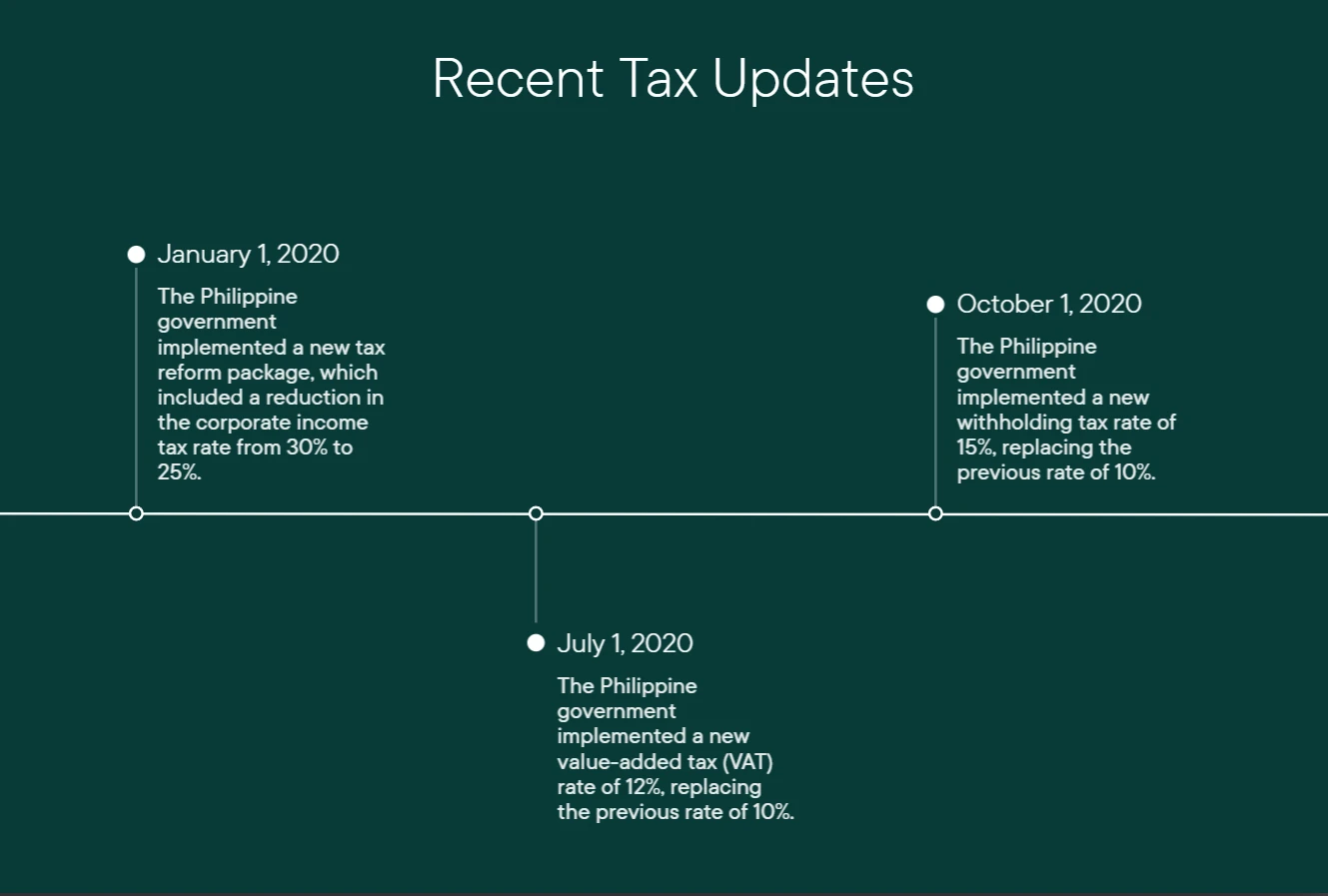Is your business considering outsourcing to the Philippines? This Southeast Asian nation has emerged as one of the most popular countries for various outsourced services, attracting companies with its robust workforce, strategic location, and favorable business climate. However, a successful outsourcing venture goes beyond initial benefits. It’s essential to understand and adhere to the country’s legal and compliance requirements.
In this article, we shed light on the crucial legal considerations when outsourcing to the Philippines, ensuring your business maneuvers the legal intricacies effectively and confidently.
QUICK NOTE: This article is for informational purposes only and is not intended to be, nor should it be taken as, legal advice. The goal of this article is to be a general guide to outsourcing in the Philippines and about compliance with local regulations. Laws and regulations can change frequently, so please schedule a call with our compliance experts for the latest, up-to-date information.
Understanding the Philippines’ Business Climate
The business climate of a country is a critical determinant in outsourcing decisions. As such, a thorough understanding of the Philippines’ business environment is crucial.
Known for its robust economy and government policies encouraging foreign investment, the Philippines presents a vibrant backdrop for outsourcing initiatives.
The country’s outsourcing industry has experienced significant growth over the past decade, propelling it to the forefront of the global Business Process Outsourcing (BPO) market. This growth has been fueled by factors such as a highly skilled labor pool, cost competitiveness, and excellent English proficiency.
In terms of government support, the Philippine Economic Zone Authority (PEZA) and the Information Technology and Business Process Association of the Philippines (IBPAP) are instrumental in facilitating and promoting the outsourcing industry.
They provide incentives such as tax holidays, duty-free importation of equipment, and simplified import-export procedures. Furthermore, the government’s continuous investment in infrastructure and education, coupled with a strong emphasis on digital literacy and technical skills development, underscores its commitment to maintaining the Philippines’ competitive edge in outsourcing.
Navigating this landscape effectively requires businesses to align their outsourcing strategies with these unique characteristics and regulatory frameworks.
1. Legal Entities in the Philippines
Understanding the different types of legal entities is a fundamental step when planning to outsource to the Philippines. Each type comes with its own benefits, challenges, and legal requirements. It’s crucial to choose the entity that aligns with your business goals and operational needs.
Corporations
Corporations in the Philippines can either be domestic or foreign. A foreign corporation can choose to do business as a branch office, a representative office, or incorporate a subsidiary. Incorporating a corporation involves registering with the Securities and Exchange Commission (SEC) and other government agencies. While a corporation offers limited liability protection and easy transfer of ownership, it also comes with requirements such as board meetings, annual reports, and possible double taxation.
Partnerships
Partnerships, on the other hand, are formed by two or more individuals or corporations who agree to contribute money, property, or industry to a common fund with the aim of dividing profits among themselves. Partnerships are easier and less expensive to form than corporations, but partners may be personally liable for the debts of the partnership, unlike corporate shareholders.
Branch Offices
A Branch Office operates in the Philippines as an extension of a foreign parent company and is not a separate legal entity. It carries out the business activities of the parent company and derives income from the host country. Establishing a branch office requires a license from the SEC and comes with annual reporting requirements.
Representative Offices
Representative Offices, unlike branch offices, are not allowed to earn income in the Philippines and are fully subsidized by their head office. They deal directly with the clients of the parent company, answering queries, providing information about the products of the parent company, and relaying the customer’s problems at the head office. The setup process is similar to that of a branch office, but it does not require a minimum investment capital.
RHQs & ROHQs
Regional Headquarters (RHQs) and Regional Operating Headquarters (ROHQs) are established by multinational companies. RHQs act as supervisory, communications, and coordinating centers for their affiliates, subsidiaries, or branches in the Asia-Pacific region. They cannot earn income in the Philippines. In contrast, ROHQs are allowed to offer qualifying services to their affiliates, subsidiaries, or branches and can earn income in the Philippines.
Ultimately, the choice of legal entity significantly influences your business operations, tax obligations, and legal liabilities when outsourcing to the Philippines. It’s therefore vital to make a well-informed decision that aligns with your business model, risk management strategy, and long-term goals.
2. Philippines Labor Laws & Regulations
Understanding the country’s labor laws and regulations is also paramount. The Philippine labor law is designed to balance the rights and interests of employers and employees, ensuring a harmonious and productive working relationship.
The Labor Code of the Philippines
The cornerstone of labor relations in the Philippines is The Labor Code. This comprehensive legal framework covers conditions of employment, labor standards, social security benefits, and dispute resolution mechanisms, among others. It’s essential to familiarize yourself with this code to ensure that your outsourcing practices adhere to the legal requirements of fair labor practices, worker safety, and compensation.
Contractual Relationships
Different types of employment contracts come into play when outsourcing in the Philippines. These include regular employment, project employment, and contractual employment. Understanding the stipulations of these contracts, such as termination conditions and employee benefits, is crucial to maintaining legal compliance and fostering good relations with your outsourced workforce.
Minimum Wage and Benefits
The Philippines has a standard minimum wage, but it varies across different regions. In addition, employees are entitled to benefits such as overtime pay, holiday pay, service incentive leave, 13th-month pay, and retirement benefits. It’s vital to consider these factors when budgeting for your outsourcing initiative.
Occupational Safety and Health Standards
The Philippines has specific regulations regarding occupational safety and health. Employers are required to comply with standards concerning working conditions, safety equipment, and employee health. Non-compliance can result in penalties and damage to your business reputation.
In essence, labor laws and regulations form a critical part of the legal landscape when outsourcing to the Philippines. Adherence to these laws not only ensures legal compliance but also contributes to a favorable working environment that enhances productivity and fosters loyalty among your outsourced staff. Navigating these laws may seem daunting, but with proper guidance and due diligence, it’s a manageable and worthwhile endeavor.
3. Philippines Intellectual Property Rights & Data Privacy
When outsourcing to the Philippines, protecting your intellectual property (IP) and ensuring data privacy are critical considerations. The country has stringent laws and regulations in place to safeguard these assets, creating a conducive environment for businesses to flourish.
Intellectual Property Rights in the Philippines
The Philippines’ IP system is primarily governed by the Intellectual Property Code, also known as Republic Act No. 8293. This code provides comprehensive protection for copyrights, patents, trademarks, and trade secrets. As an outsourcing business, it’s vital to register and protect your intellectual property rights in the Philippines to prevent infringement and unauthorized use.
Data Privacy Act of 2012
Data privacy is another significant concern in the digital age. The Data Privacy Act of 2012 (Republic Act No. 10173) is the Philippines’ primary law for data protection. This law applies to the processing of all types of personal data and mandates the protection of personal information by agencies, including those involved in outsourcing.
Compliance with the Law
Compliance with these laws requires implementing appropriate security measures to protect your intellectual property and data. This might involve employee training, use of secure platforms for data transmission, regular audits, and creating confidentiality agreements for staff.
Legal Recourse
In the event of any violation of IP rights or data privacy, understanding the legal recourse available is crucial. This includes knowing the jurisdiction of various courts, the process of litigation, and the potential remedies and penalties.
Navigating the realm of intellectual property rights and data privacy when outsourcing to the Philippines may seem like a daunting task. However, with the right knowledge and careful planning, you can safeguard your business interests and reap the benefits of this dynamic outsourcing destination. Always consider consulting with legal experts in these areas to ensure that your business remains protected and compliant.
4. Philippines Tax Obligations & Incentives
Navigating the tax landscape is a key aspect of outsourcing to the Philippines. The country’s tax system is multifaceted, with a mix of obligations and incentives that businesses need to understand to effectively manage their operations and maximize opportunities.
Tax Obligations
Outsourcing companies in the Philippines are subject to a variety of taxes, including corporate income tax, value-added tax (VAT), and withholding taxes. It’s critical to understand your tax obligations, including rates, payment deadlines, and filing requirements, to avoid penalties and ensure compliance with the Bureau of Internal Revenue (BIR).
Corporate Income Tax
Corporate Income Tax is levied on net income earned by corporations. The rate varies depending on a variety of factors, including the type of company and its level of taxable income.
Value-Added Tax
Value-Added Tax (VAT) is imposed on the sale of goods and services in the Philippines. Businesses are required to register for VAT and regularly file VAT returns.
Withholding Taxes
Withholding taxes are deducted at source on various types of payments, including salaries, professional fees, and rents. The withholding agent (employer or payer) is responsible for withholding and remitting these taxes to the BIR.
Tax Incentives
The Philippines offers a range of tax incentives for businesses, including those involved in outsourcing. These incentives, provided by bodies like the Board of Investments (BOI) and the PEZA, can include income tax holidays, special tax rates, and duty-free importation of equipment.
Seeking Professional Advice
The Philippines’ tax environment can be complex, so seeking professional advice is advisable. Engaging a tax consultant or legal advisor can help clarify your tax obligations, maximize available incentives, and ensure compliance.
5. Philippines Dispute Resolution & Enforcement of Foreign Judgments
In any business relationship, especially when it involves cross-border operations like outsourcing, disputes can arise. Knowing how to navigate the dispute resolution landscape in the Philippines, as well as understanding how foreign judgments can be enforced, is an essential part of the legal considerations.
Dispute Resolution in the Philippines
There are several ways to resolve business disputes in the Philippines, each with its own benefits and challenges. The most common methods are litigation and alternative dispute resolution (ADR).
Litigation
Litigation is the traditional method of dispute resolution, involving court proceedings. In the Philippines, civil cases are initiated in the Regional Trial Courts. It’s important to note that litigation can be time-consuming and costly.
Alternative Dispute Resolution
ADR is a less formal, often quicker, and sometimes more cost-effective way of resolving disputes. The two most common forms of ADR in the Philippines are mediation and arbitration. In mediation, a neutral third party helps the disputing parties reach a voluntary agreement. In arbitration, an arbitrator makes a decision after hearing the arguments of both parties.
Enforcement of Foreign Judgments
In situations where a foreign judgment has been obtained, enforcement in the Philippines is governed by the Rules of Court. Foreign judgments are prima facie evidence of a right, and can be repelled by evidence of a want of jurisdiction, want of notice to the party, collusion, fraud, or clear mistake of law or fact. It’s important to understand the process and requirements for enforcement to ensure the effectiveness of a foreign judgment.
Engaging Legal Counsel
Given the complexities involved in dispute resolution and enforcement of foreign judgments, it’s advisable to engage legal counsel experienced in Philippine law. They can provide valuable guidance throughout the process and increase the likelihood of a favorable outcome.
In conclusion, understanding the methods for resolving disputes and enforcing foreign judgments is vital when outsourcing to the Philippines. By preparing for these potential legal challenges, you can mitigate risks and protect your business interests.
Conclusion
Outsourcing to the Philippines presents an array of opportunities for businesses seeking to capitalize on the country’s robust talent pool and cost advantages. However, it’s imperative to comprehend the legal landscape to ensure smooth operations and mitigate potential risks. From labor laws and intellectual property rights to data privacy, tax obligations, and dispute resolution, each aspect plays a crucial role in shaping your outsourcing experience. By being diligent and proactive in understanding and complying with these laws, you can set the foundation for a successful and sustainable outsourcing venture.
As you navigate these complexities, remember that you don’t have to do it alone. At 1840 & Company, we specialize in helping businesses like yours make the most of outsourcing to the Philippines (as well as 150 countries). Our trusted advisors can guide you through each step of the process, ensuring compliance, reducing risks, and unlocking the full potential of your global team. Schedule a call to learn more about how we can accelerate your business growth through outsourcing.







